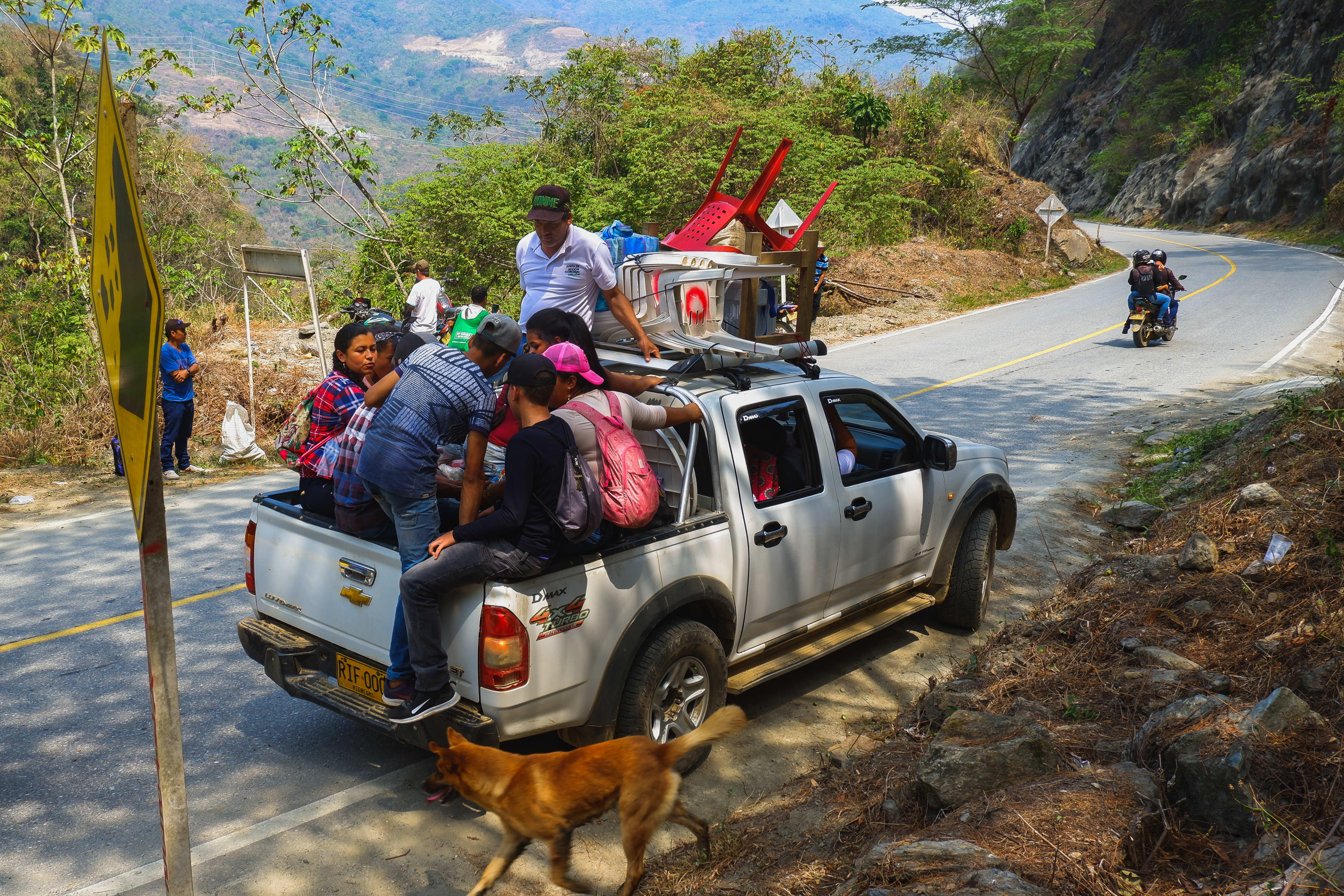This project is now in update mode. Check back regularly to see how things are progressing.
An Uncomfortable Peace
Versión en español abajo
“An Uncomfortable Peace” is a documentary film that follows three families in the rural community of Briceño, known as Colombia’s Laboratory of Peace. Before coronavirus hit, we filmed for a month, beginning to document our participants’ lives and stories. Now we’re asking for your donation to help us finish this important project.
Setting the Scene
Loading up to travel to the dam.
On a sunny Sunday morning, a dozen campesinos (peasants) load up mandarin oranges, sugarcane juice, coffee beans, and other products from their farms onto motorcycles and a borrowed truck. As we film, they travel in convoy down a serpentine dirt road to a not-yet-opened hydroelectric dam. “When we arrive, we need to be ready to unload and set up the tables immediately,” says Fabio, a veteran of eight years of organizing against the dam that has wreaked havoc in their community.
“They’re going to jump on us immediately, saying, ‘you can’t be here, you need to leave.’ What are we going to say?” Angélica, Fabio's partner in life and struggle, asks.
“We’re going to say, 'we can’t fish anymore, we can’t pan for gold'," Maria says. "That we pulled out all our (coca) crops. That the government hasn’t lived up to its promises. We’ve taken our products to sell. So what are we going to do? They need to give us a solution.”
The isolated village of Briceño is a key site for the implementation of Colombia’s landmark peace agreement. The region was a battle zone between the army and the Revolutionary Armed Forces of Colombia (FARC) and paramilitary groups who fought to control the local coca economy. As part of the 2016 agreement, Briceño was named the pilot site of a coca substitution program, which has brought promises of state investment and an uncomfortable peace. However, major delays in promised aid have led to the disappearance of the coca economy with nothing to replace it. At the same time, Hidroituango, the largest hydroelectric dam in Colombia, has eliminated local access to the Cauca river and traditional economies based around gold panning and fishing. And a Chinese company further threatens the local environment and livelihoods with plans to open a gold mine.
Over the objections of dam security and heavily armed police officers, the families sold their goods in the dam’s parking lot. But just as their struggle to open this market at the foot of the dam is about more than a strategic sales point, the story of our documentary is about more than a rural community being run over by the forces of development and state power. We are documenting these families’ often contentious struggles to carve out lives for themselves in the midst of regional transition.
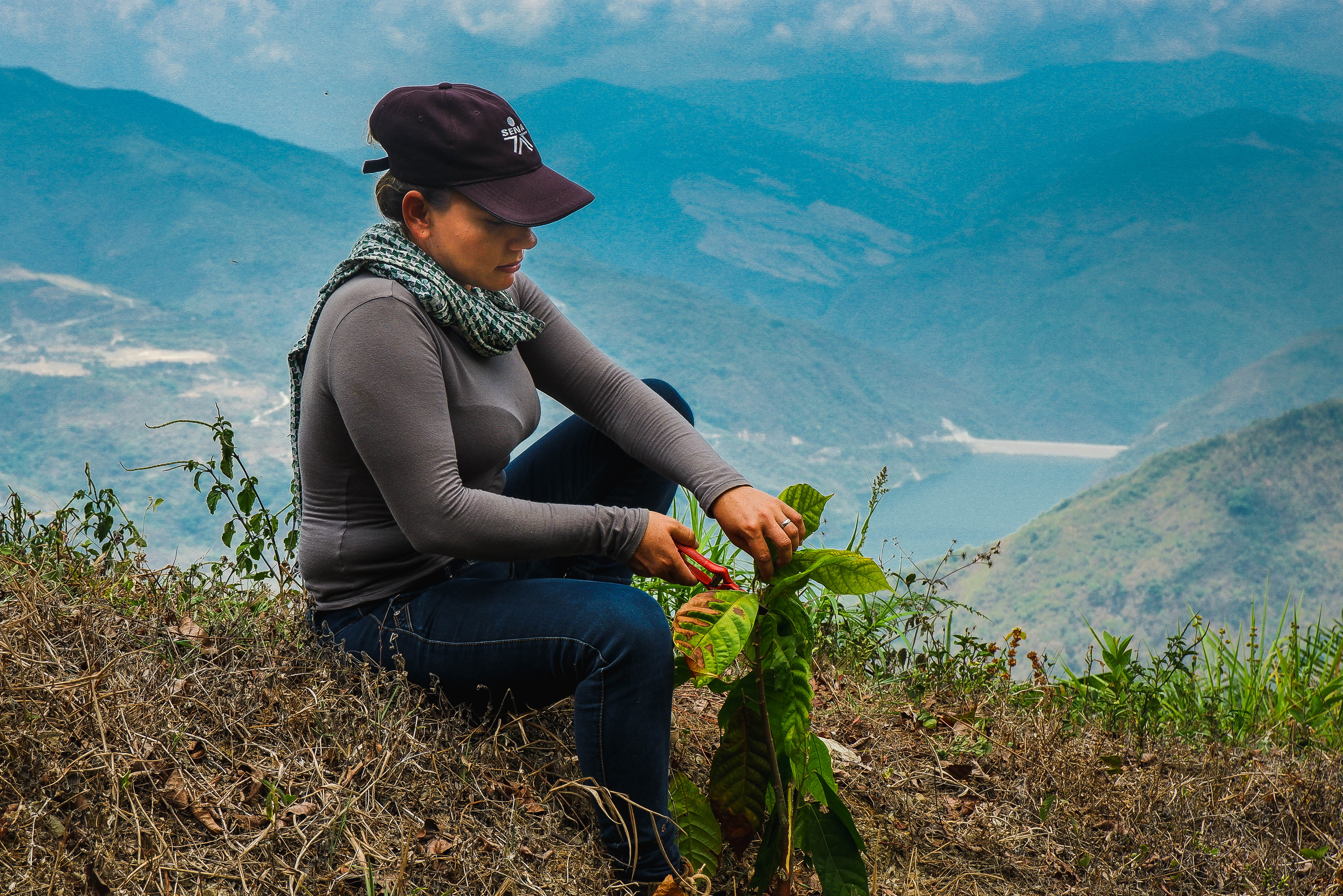
Yaned trims her cacao with the hydroelectric dam in the background.
For Yaned, this means raising the cacao trees that she’s planted to replace her coca, with or without the help of delayed productive projects that were promised as part of the coca substitution program. For Fabio and Angélica this means a battle to be autonomous, growing nearly everything they eat with agroecological practices, and seeking the spaces (including the dam parking lot) to sell their coffee and chocolate. For Suso and Eugenia, this means living between Briceño and the closest big city of Medellín, seeking a better education for their four children.
With your help, we will collaborate with them to tell their stories.
How You Can Help
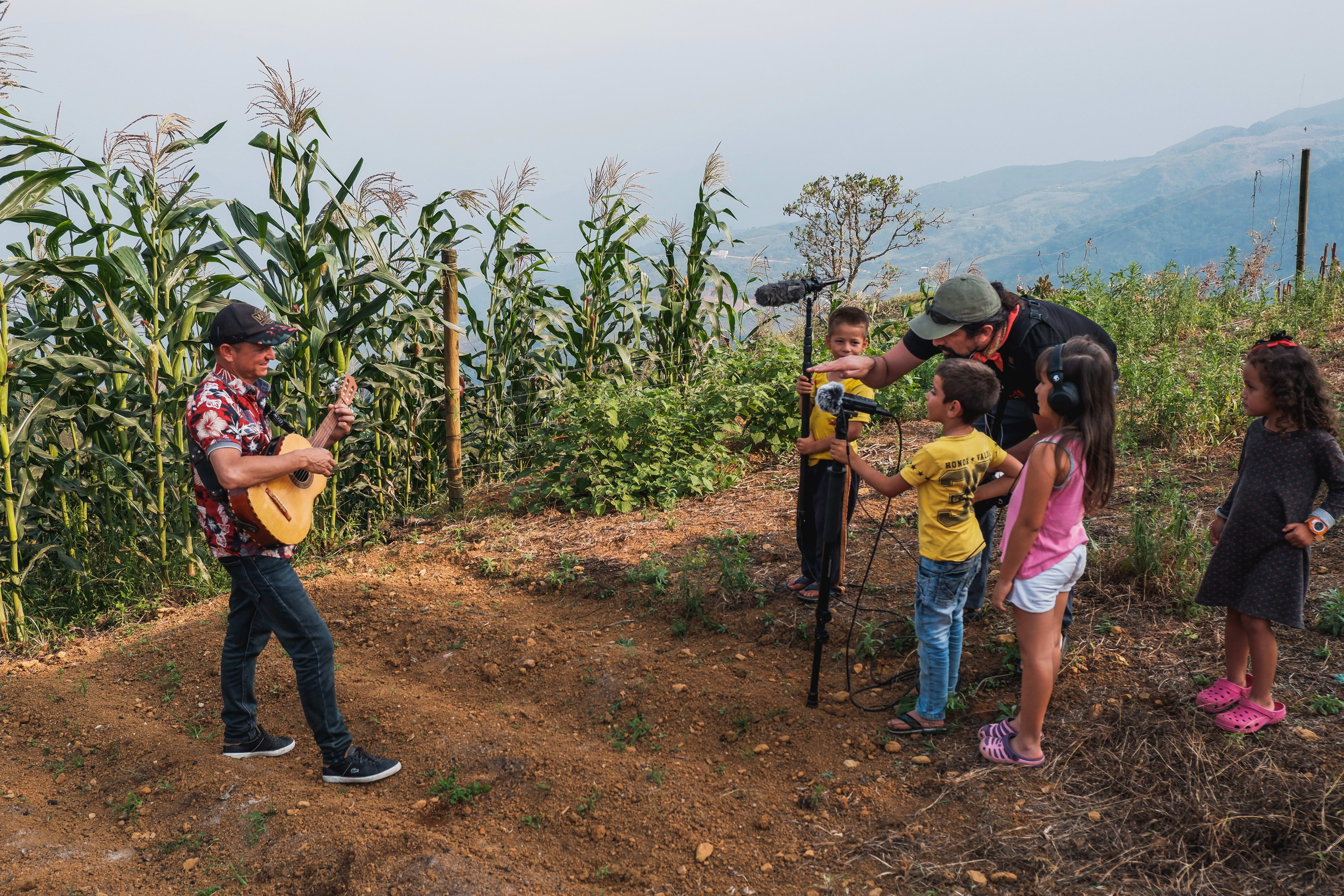
We enlisted (some of the smallest) community members to help with filming.
We need $7,000 to finish recording and editing the documentary. We have already begun filming, financing the project from our own pockets as we have started to capture the stories and lives of the families this project is based on. But to do justice to these stories and Briceño’s beautiful landscapes, we need money. Your contribution will help us:
- Hire a boat and travel with community members up the Cauca river to document struggles against the dam and artisanal fishing and gold panning practices.
- Rent a drone for aerial shots of the region.
- Buy needed sound recording equipment.
- Cover our daily expenses: transportation as well as a subsidy for the local families that feed and house us.
- Pay for sound and video editing in post-production.
Una Paz Incómoda
“Una Paz Incómoda” es un documental que cuenta la historia de tres familias en la comunidad rural de Briceño, conocido como el Laboratorio de Paz de Colombia. Antes de la pandemia grabamos por un mes documentando las vidas e historias de nuestros participantes. Ahora esperamos tu donación para ayudarnos a terminar este importante proyecto.
Preparando la escena

Vendiendo al pie de la represa.
Es un domingo soleado, doce campesinos cargan mandarinas, guarapo, café y otros productos de sus fincas en motos y una camioneta prestada. Mientras grabamos, bajan por una vía serpenteante sin pavimentar hasta una represa que todavía no está en pleno funcionamiento. “Cuando lleguemos, necesitamos estar listos para descargar e ir armando las mesas rápido,” dice Fabio, quien lleva ocho años participando en un movimiento social contra la represa que ha hecho estragos en su comunidad.
"De una nos van a caer: que 'aquí no pueden estar, tienen que salir'. ¿Qué vamos a decir?" pregunta Angélica, compañera de Fabio en la lucha y en la vida.
"Vamos a decir que ya no podemos pescar,” dice Maria. “Que ya no podemos barequear. Que ya arrancamos todos los cultivos (de coca). Que el gobierno nos ha incumplido. Que sacamos los productos a vender. Entonces qué vamos a hacer? Que nos den una solución.”
El aislado pueblo de Briceño es clave para la implementación del histórico acuerdo de paz de Colombia. La región era zona de combate entre el ejército, grupos de las Fuerzas Armadas Revolucionarias de Colombia (FARC) y paramilitares que se disputaban el control de la economía local de la coca. Como parte del acuerdo de 2016, Briceño fue elegido para el programa piloto de sustitución de coca, lo cual trajo promesas de inversión estatal y una paz incómoda. El retraso de la ayuda prometida ha causado la desaparición de la economía cocalera, sin nada que la reemplace hasta hoy. A la vez, Hidroituango, la represa hidroeléctrica más grande de Colombia, ha eliminado acceso local al río Cauca y las economías tradicionales del barequeo y la pesca. Como si no fuera suficiente, una empresa China también amenaza el medio ambiente y los sustentos locales con sus planes de abrir una mina de oro.
Los campesinos de El Orejón vendieron sus productos en el parqueadero de la represa, ignorando la oposición de los vigilantes de la represa, policías fuertemente armados y el inspector de policía. Pero más que los intentos de abrir el mercado local en un punto de venta estratégico, nuestro documental aborda mucho más que el atropello de una comunidad rural por las fuerzas del desarrollo y el poder estatal. Estamos documentando las luchas de estas familias por forjarse una vida en medio de una transición regional.
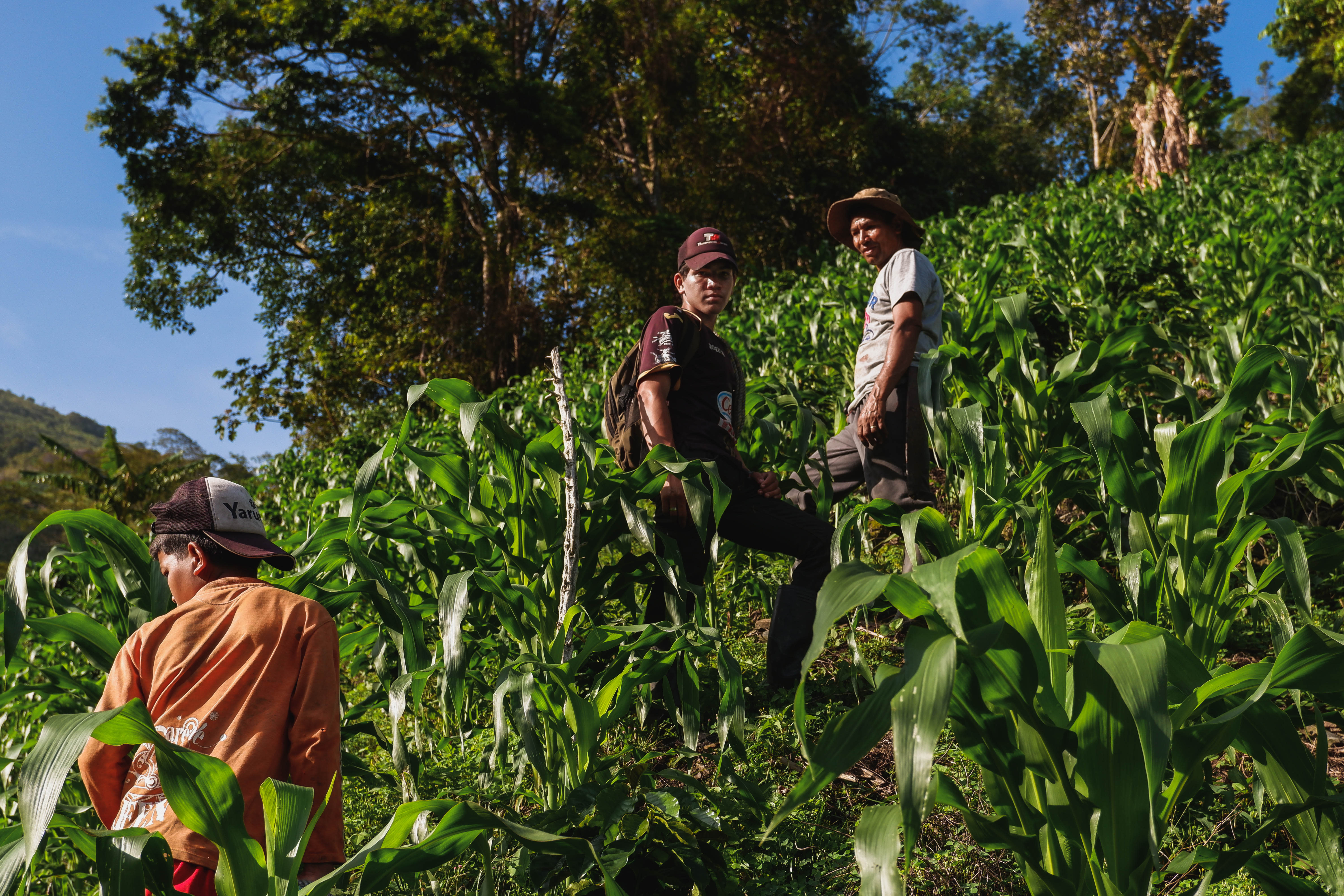
Suso, aquí con sus hijos Adrian y Sebastian en su maizal, ha pasado casi todo su vida en el campo, pero ahora busca mejores oportunidades para sus hijos en la ciudad.
Para Yaned, esto significa cultivar el cacao que ha sembrado para reemplazar sus cultivos de coca, lleguen o no los proyectos productivos retrasados que le fueron prometidos como parte del programa de sustitución de la coca. Para Fabio y Angélica, esto significa la lucha de ser autónomos, cultivando casi todo lo que comen con practicas amigables con el medio ambiente y vendiendo ellos mismos (incluso en el parqueadero de la represa) el cacao y café orgánico de su finca. Para Suso y Eugenia, esto significa vivir entre Briceño y la ciudad de Medellín, buscando una mejor educación para sus cuatro hijos. Con tu ayuda, podremos ayudarles a contar sus historias.
Cómo Puedes Ayudar?
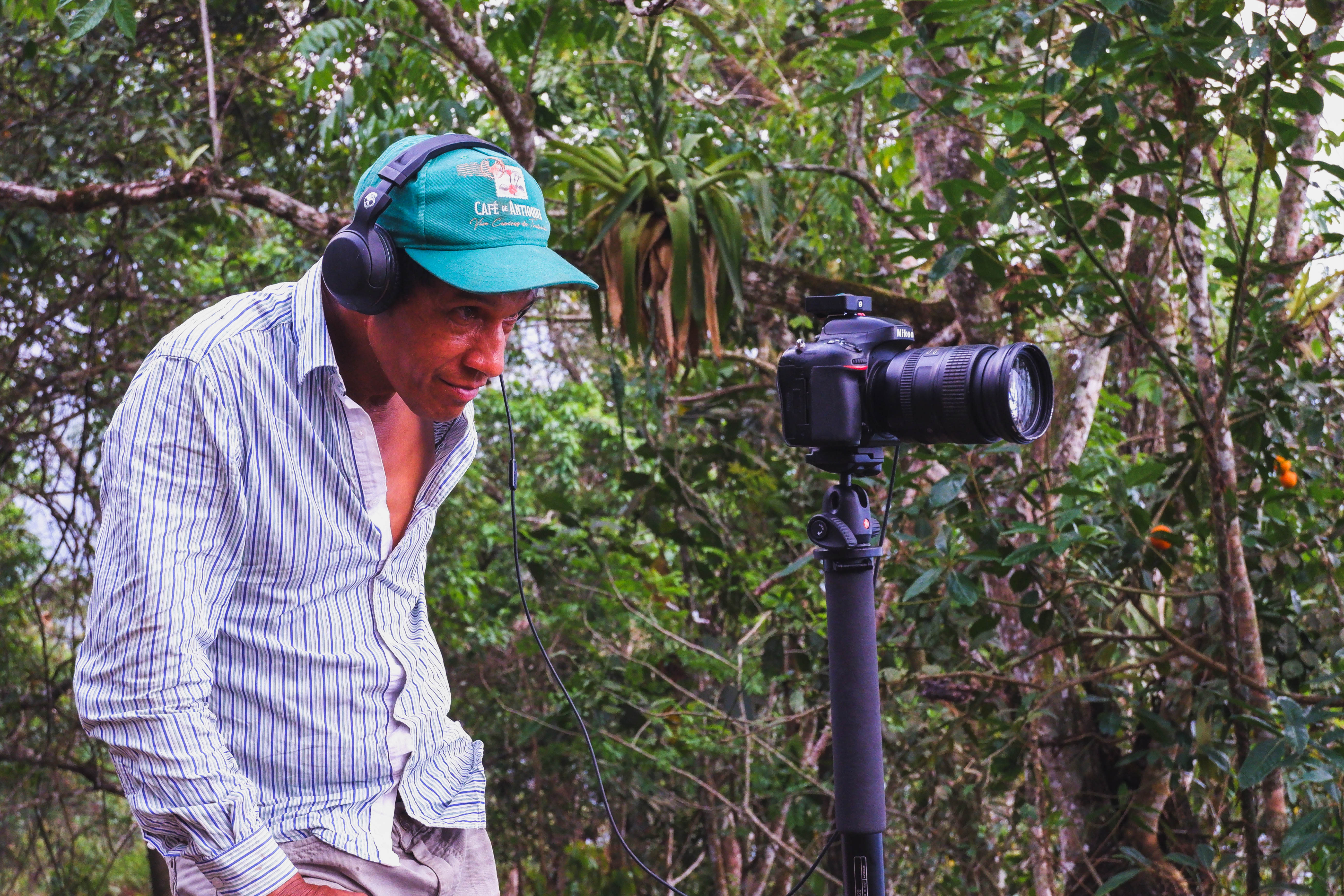
Fabio tomando su turno detrás de la cámara.
Necesitamos $7,000 para terminar de grabar y editar el documental. Ya hemos empezado a grabar, financiando el proyecto con nuestros propios bolsillos mientras comenzamos a capturar las historias y vidas de las familias protagonistas del proyecto. Pero para representar debidamente a estas historias y los hermosos paisajes de Briceño, necesitamos dinero. Tu contribución nos ayudará a:
-
Alquilar una lancha y navegar el río Cauca con miembros de la comunidad para documentar las luchas contra la represa y las prácticas artesanales del barequeo y la pesca.
-
Arrendar un dron para las tomas aéreas de la región.
-
Comprar equipos necesarios para grabar sonido.
-
Cubrir nuestros gastos diarios, como el transporte y un aporte para las familias locales que nos albergan y alimentan.
-
Pagar la edición de video y sonido en la post-producción.
Si estás en Colombia y quieres apoyarnos, puedes hacer tu donación a la cuenta 27205310237, ahorros Bancolombia (cuenta de Oscar Alberto Osorio Ruiz C.C 1128425349). Por favor tomar un pantallazo de la transferencia y enviarlo por mensaje de Whatsapp al número de celular 3194046194 ¡Gracias por tu ayuda!
$25
First Unit Fixer
Treat the crew to an on-location delicious homemade meal. While filming, we live with our documentary subjects, eating fresh and natural food from their farms. Reward: We will invite you to a special pre-release screening of the film.
$50
Guillotine Master
Pay for one hour of source recording editing. Once we finish filming, the real work begins! Reward: Access to the pre-release screening, plus an exclusive conversation with the filmmakers.
$100
Effects Guru
Pay for two hours of online editing of motion graphics. Reward: All the previous rewards, plus get your name in the credits.
$250
Drone Pilot
Pay for drone rental for one week. A drone will let us get beautiful aerial shots crucial for understanding the local terrain. Reward: All the previous rewards, plus we will mail you a pack of five color photos that document rural life in Briceño.
$500
Cauca Captain
Help us hire a boat for an overnight trip on the Cauca river with our participants to visit sites of struggle against the dam and record ancestral practices of gold panning. Reward: All the previous awards, plus a digital copy of the final product.
$1,000
Executive Producer
Pay for our computer graphics, including animation and after effects. Rewards: All the previous awards, plus a major tax break!








